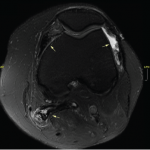(Reuters Health)—People with type 1 diabetes often develop other autoimmune disorders, such as thyroid and gastrointestinal diseases, and a recent study yields new information about this link.
In the study, 27% of patients with type 1 diabetes had at least one other autoimmune disorder.
But the new study also held some surprises about how early and late in life these added health problems might surface, says lead author Dr. Jing Hughes of Washington University School of Medicine in St. Louis.
“The pattern that emerged was striking: autoimmune diseases begin early in childhood, where nearly 20% of those under age 6 already have additional diseases other than type 1 diabetes,” Hughes says by email.
“Another surprise finding was that, while we had expected that autoimmune diseases may peak at a certain time of life, we found instead that the autoimmune burden continues to increase as patients age, to the extent that nearly 50% of those over age 65 have accumulated one or more additional autoimmune disease,” Hughes adds.
The findings are drawn from data on nearly 26,000 adults and children being treated for type 1 diabetes at 80 endocrinology practices in the U.S. between 2010 and 2016.
Of those with other autoimmune disorders in addition to diabetes, 20% had one additional problem and 5% had at least two additional diseases, researchers report in the Journal of Clinical Endocrinology and Metabolism, Sept. 27.1
Participants with one or more additional autoimmune disorders were more likely to be older, female and white, the study found. They also tended to have been diagnosed with type 1 diabetes at an older age and to have lived with the condition for longer.
Thyroid diseases were the most common autoimmune disorders, affecting about 24% of the participants. In most of these cases, the thyroid gland was underactive, which can lead to constipation, weakness, weight gain, depression and a slowed heart rate.
Celiac disease was the second most common autoimmune problem, affecting about 6% of participants.
Other diseases included Graves disease (overactive thyroid), rheumatoid arthritis and vitiligo.
One limitation of the study is that researchers lacked data on how old patients were when the autoimmune disorders developed, making it impossible to determine if participants gradually accumulated these diseases over time or if they were clustered around a certain age, the authors note.
Even so, the findings suggest that people with type 1 diabetes should get routine screening for other autoimmune diseases—particularly celiac disease and thyroid disorders—the authors conclude.
“The take home message is that kids with type 1 diabetes are at increased risk for developing other autoimmune diseases compared with kids who don’t have type 1 diabetes,” says Dr. Laurie Tsilianidis, an endocrinologist at Cleveland Clinic Children’s in Ohio who wasn’t involved in the study.
“This is particularly true once they become adults, and Caucasian women carry the greatest risk,” Tsilianidis adds by email.
Reference
- Hughes JW, Riddlesworth TD, DiMeglio LA, et al. Autoimmune diseases in children and adults with type 1 diabetes from the T1D exchange clinic registry. J Clin Endocrinol Metab. 2016 Sep 27:jc20162478. [Epub ahead of print]


